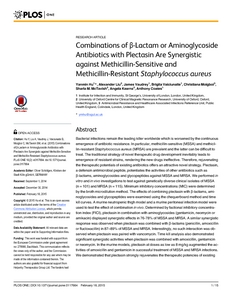Hu, Y; Liu, A; Vaudrey, J; Vaiciunaite, B; Moigboi, C; McTavish, SM; Kearns, A; Coates, A
(2015)
Combinations of β-lactam or aminoglycoside antibiotics with plectasin are synergistic against methicillin-sensitive and methicillin-resistant Staphylococcus aureus.
PLoS One, 10 (2).
e0117664.
ISSN 1932-6203
https://doi.org/10.1371/journal.pone.0117664
SGUL Authors: Coates, Anthony Robert Milnes Hu, Yanmin
![[img]](https://openaccess.sgul.ac.uk/107380/1.hassmallThumbnailVersion/Combinations_of_%CE%B2_Lactam_or_aminoglycoside_antibiotics_with_plectasin.pdf)  Preview |
|
["document_typename_application/pdf; charset=binary" not defined]
Published Version
Download (1MB)
| Preview
|
Abstract
Bacterial infections remain the leading killer worldwide which is worsened by the continuous emergence of antibiotic resistance. In particular, methicillin-sensitive (MSSA) and methicillin-resistant Staphylococcus aureus (MRSA) are prevalent and the latter can be difficult to treat. The traditional strategy of novel therapeutic drug development inevitably leads to emergence of resistant strains, rendering the new drugs ineffective. Therefore, rejuvenating the therapeutic potentials of existing antibiotics offers an attractive novel strategy. Plectasin, a defensin antimicrobial peptide, potentiates the activities of other antibiotics such as β-lactams, aminoglycosides and glycopeptides against MSSA and MRSA. We performed in vitro and in vivo investigations to test against genetically diverse clinical isolates of MSSA (n = 101) and MRSA (n = 115). Minimum inhibitory concentrations (MIC) were determined by the broth microdilution method. The effects of combining plectasin with β-lactams, aminoglycosides and glycopeptides were examined using the chequerboard method and time kill curves. A murine neutropenic thigh model and a murine peritoneal infection model were used to test the effect of combination in vivo. Determined by factional inhibitory concentration index (FICI), plectasin in combination with aminoglycosides (gentamicin, neomycin or amikacin) displayed synergistic effects in 76-78% of MSSA and MRSA. A similar synergistic response was observed when plectasin was combined with β-lactams (penicillin, amoxicillin or flucloxacillin) in 87-89% of MSSA and MRSA. Interestingly, no such interaction was observed when plectasin was paired with vancomycin. Time kill analysis also demonstrated significant synergistic activities when plectasin was combined with amoxicillin, gentamicin or neomycin. In the murine models, plectasin at doses as low as 8 mg/kg augmented the activities of amoxicillin and gentamicin in successful treatment of MSSA and MRSA infections. We demonstrated that plectasin strongly rejuvenates the therapeutic potencies of existing antibiotics in vitro and in vivo. This is a novel strategy that can have major clinical implications in our fight against bacterial infections.
Statistics
Item downloaded times since 24 Apr 2015.
Actions (login required)
 |
Edit Item |



